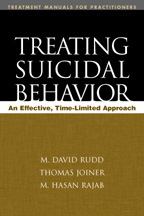 by M. David Rudd, Thomas E. Joiner, and M. Hasan Rajab
by M. David Rudd, Thomas E. Joiner, and M. Hasan Rajab
The clinician is guided to assess suicidal behavior and implement interventions tailored to the severity, chronicity, and diagnostic complexity of the patient's symptoms.
Full Description:
Grounded in a comprehensive model of suicidality, this volume describes an empirically supported cognitive-behavioral treatment approach. The clinician is guided to assess suicidal behavior and implement interventions tailored to the severity, chronicity, and diagnostic complexity of the patient's symptoms. Provided are session-by-session guidelines and clear-cut strategies for defusing the initial crisis; reducing suicidal behavior; restructuring suicide-related beliefs; and building interpersonal assertiveness, distress tolerance, problem solving, and other key skills. A special chapter covers risk assessment. Enhancing the book's utility are tables, figures, and sample handouts and forms, some of which may be reproduced for professional use. "The text has numerous strengths including its theoretically grounded approach towards assessing suicide risk, clear session-by-session outlines of the implementation of both short- and long-term treatment strategies, and rich descriptions of empirical support for the techniques proposed....An exceptional guide to help clinicians effectively and efficiently treat suicidality, and the authors animate the test by providing a multitude of client worksheets, session transcripts, and flow charts. This book will definitely be on my list of recommendations for students and colleagues who want either to build or to strengthen their foundation in conduction cognitive therapy."
-Cognitive Behavioral Therapy Book Reviews "The authors manage to incorporate the wisdom of empirical science into a realistic and user-friendly practical approach, a rare accomplishment in the contemporary literature. The liberal use of intriguing case examples helps illustrate a broad range of theoretically grounded, intuitively appealing techniques and interventions that are essential to lifesaving clinical work. Written with great clarity, the book will be valuable for everyone from graduate students to mature clinicians."
-David A. Jobes, PhD, Department of Psychology, Catholic University of America; past president, American Association of Suicidology M. David Rudd, PhD, is Professor of Psychology and Director of Clinical Training at Baylor University. He also maintains a part-time private practice. Dr. Rudd received his doctorate from the University of Texas at Austin and completed postdoctoral training at the Beck Institute in Philadelphia. He is the author of over 60 articles and book chapters.
Thomas E. Joiner, PhD, is Professor of Psychology and Director of the Psychology Clinic at Florida State University. He completed his doctoral training at the University of Texas at Austin. Dr. Joiner has authored over 100 articles and book chapters in the areas of depression, eating disorders, and suicidality.
M. Hasan Rajab, PhD, is Associate Professor in the Department of Psychiatry and Behavioral Science at Texas A&M Health Science Center. Dr. Rajab completed his doctoral training in biostatistics at Texas A&M University. He is the author of several articles addressing a range of issues in methodology and biostatistics.
274 Pages, Size: 6" x 9"
ISBN:
I. Establishing a Foundation for Treatment 1. What Do We Really Know about Treating Suicidality?: A Critical Review of the Literature 2. A Cognitive-Behavioral Model of Suicidality 3. An Overview of the Treatment Process II. Assessment and Treatment 4. Treatment Course and Session-by-Session Guidelines 5. The Evaluation Process and the Initial Interviews 6. Assessing Suicide Risk 7. Crisis Intervention and Initial Symptom Management 8. Reducing and Eliminating Suicide-Related Behaviors 9. Cognitive Restructuring: Changing the Suicidal Belief System and Building a Philosophy for Living 10. Skill Building: Developing Adaptive Modes and Ensuring Lasting Change
Stock: Usually ships in 3-7 business days!
|